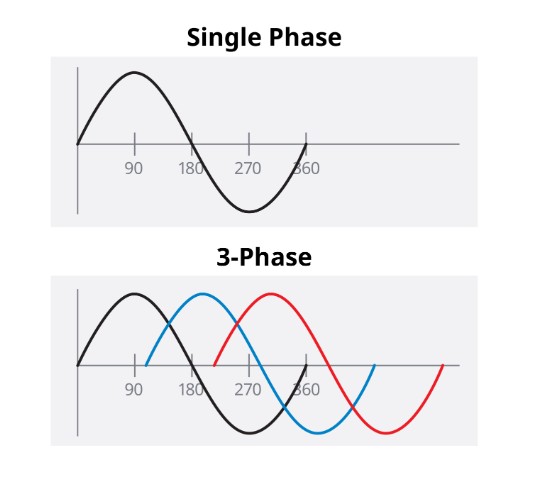What Is 3-Phase Power and Why Is It Used in UPS Systems?
3-phase power refers to a specific type of electrical power generation, transmission, and distribution that uses three alternating currents (AC), which are offset in phase by 120 degrees. This system is widely utilized in many industrial and commercial applications due to its efficiency and effectiveness compared to single-phase power.
Single-phase UPS systems are well-suited for smaller IT environments, providing dependable power protection for sensitive electronic equipment. For larger facilities or data centers, three-phase UPS systems offer greater power capacity, improved efficiency, and centralized power management.

The Basics of 3-Phase Power
In a 3-phase power supply, the three currents feed into a three-wire system, providing a consistent and more reliable energy source. Each phase reaches its peak voltage at different times, ensuring that there is always power available, which leads to smoother power distribution and reduced fluctuations. The main components of a 3-phase power system include:
- Generators: These convert mechanical energy into electrical energy.
- Transformers: These modify voltage levels to optimize transmission and usage.
- Motors: These are often more efficient in a 3-phase system, reducing energy loss.
Advantages of 3-Phase Power
3-phase power systems offer several distinct advantages over their single-phase counterparts:
- Higher Efficiency: 3-phase systems are more efficient because they can transmit more power through smaller conductors, reducing material costs.
- Reduced Voltage Drops: The constant flow of power reduces the likelihood of voltage drops, leading to reliable performance.
- Improved Load Balance: 3-phase systems can handle larger loads more effectively, making them ideal for industrial applications.
- Less Vibration in Motors: Motors operated on 3-phase power produce less vibration, enhancing their lifespan and operational smoothness.
Why 3-Phase Power is Used in UPS Systems
Uninterruptible Power Supply (UPS) systems are essential for maintaining power continuity in critical applications, such as data centers, hospitals, and manufacturing plants. These systems require a stable and reliable power source to prevent interruptions that could lead to data loss, equipment damage, or serious operational disruptions.
Benefits of 3-Phase Power in UPS:
- Increased Capacity: 3-phase UPS systems can handle larger loads, necessary for supporting multiple devices or high-demand equipment.
- Scalability: The modular design of 3-phase UPS systems allows for easy scalability as the power needs of a facility grow.
- Energy Savings: 3-phase systems are generally more energy-efficient, leading to reduced operational costs over time.
- Improved Reliability: With balanced loading and the ability to continue power supply during fluctuations, 3-phase UPS systems enhance reliability.
Conclusion
In summary, 3-phase power offers significant advantages that make it the preferred choice in UPS systems, particularly for large commercial and industrial applications. Its efficiency, reliability, and capability to handle heavy loads ensure that critical systems remain powered and operational, safeguarding businesses from potential interruptions.